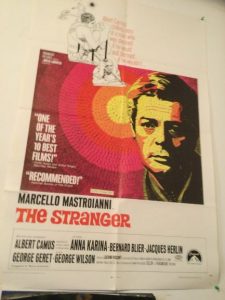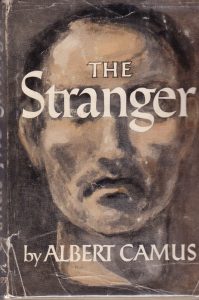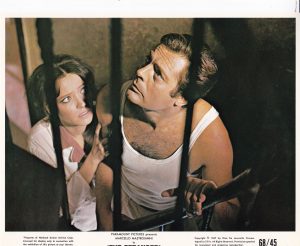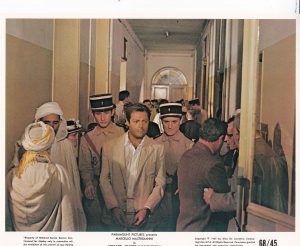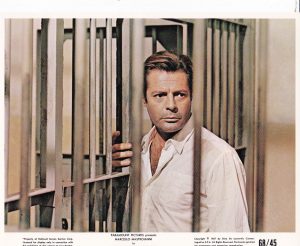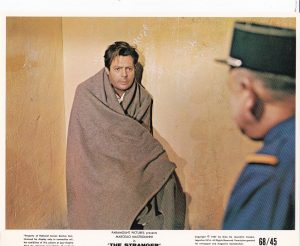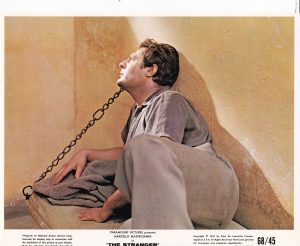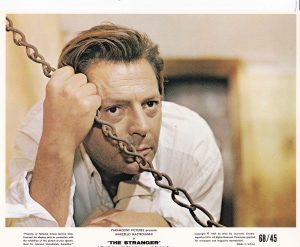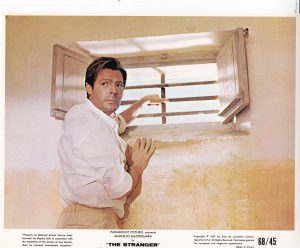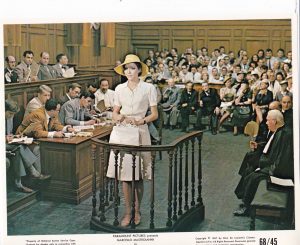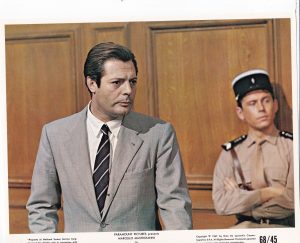1967’s The Stranger, director’s Luchino Visconti’s totally faithful adaptation of Albert Camus’s excellent 1942 Existentialist novella.
Meursault (Marcello Mastroianni is perfectly cast) is a likable, ordinary, humble, easy-going, honest man who seems mostly like a spectator of life, going with the flow of life around him.
He is accustomed to not making trouble and pleasing others; if anything, he has no strong preferences about most things: “It means nothing to me” is his common refrain.
Spoiler: But gradually, he becomes engage (you’ll have to provide the French accents) and ‘accidentally’ murders an armed Arab on a beach in the climax. In truth, he was delirious with summer heat and somewhat blinded by the sun, and instinctively, pulls out a revolver he happened to be carrying when the Arab lunges at him.
The absurd trial and final scene that follows makes many of the central points that Camus made in his original:
-that appearances and individual behavior/choices can be misread/misinterpreted by society
-that context and circumstance can determine one’s destiny apart from individual will
-that an individual can be condemned for being too honest
-that unconventional individuals are prone to misjudgement
-that religious people often have little tolerance and understanding of people who are unconventional non-believers.
-that justice can be ‘blind’ to the actual lived experience of accused individuals
-that justice and religion often have limited/limiting agendas.
-that people often don’t truly know or understand one another
-that violence is a common theme in human affairs
-that many people are and feel alone, isolated, alienated from others
-that many people never think much or deeply about their lives and choices until confronted with the immediacy of death.
There is much to admire about this thoughtful ‘little art film’ which never made it to DVD. Visconti connects characters like Meursault, Raymond, and the old man regarding their violence. He connects the priest to the various lawyers with respect to conventional religion, even satirizing them in a couple of places.
And the various other characters are all strong including Anna Karina as Meursault’s girlfriend, Raymond, and the old man. The pace of the film is alternately a casual, controlled flow (reflecting Meursault’s personality) and headlong ‘swirl’ (once the murder occurs).
I first saw this intelligent, sensitive film in 1971 when I was a Comparative Literature student studying Camus’s book and it was a knockout then and still is some 50 years later. It’s very memorable, powerful, and thought-provoking. It will get a viewer to question what happens, the choices Meursault makes, and the viewer’s own views on life and death. You can’t ask for much more than that from a movie or book. Two thumbs way up.
……………………………………………………
The ideas of the book/movie listed above made quite the impression on me back in ’71; I found myself mostly in agreement with them, and had no problem understanding Meursault. Camus’s 1967 American edition of his book:
Lobby cards of the film from my personal collection; the main focus is on Meursault (Mastroianni) since it is his story/his thoughts which help to carry the narrative via voiceovers:

